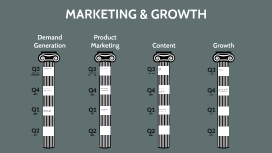Marketing Presentation Template
Transcript: Measuring Marketing Success Understanding key metrics helps evaluate the effectiveness of marketing strategies. Email Marketing Best Practices 150% A structured approach to optimizing email marketing efforts for better engagement and results. $50 3.5% Average ROI on digital marketing campaigns Average customer acquisition cost for e-commerce brands Average conversion rate across industries Marketing Presentation Template Step 3: Analyze Results Step 1: Build a Quality List Measure open and click rates to assess performance and refine strategies for future campaigns. Collect emails ethically by offering value in exchange for sign-ups, ensuring compliance with data privacy laws. Step 2: Personalize Content Tailor messages to recipients by using their names and preferences to increase relevance and engagement. A comprehensive guide to marketing strategies and templates Social Media Marketing Strategies In today's competitive landscape, effective marketing integrates storytelling to engage audiences, foster connections, and drive brand loyalty. A structured approach to leveraging social media for effective marketing. Conclusion and Q&A Monitoring and Adjustment Content Creation Goal Setting Engagement and Community Building Regularly analyze performance metrics and adapt strategies to improve results. Platform Selection Establish clear objectives, such as brand awareness, lead generation, or customer engagement. Develop and schedule engaging content tailored to each platform and audience preference. Interact with followers, respond to inquiries, and cultivate a loyal community around the brand. Identify the most suitable social media platforms based on target audience demographics and behaviors. Content Marketing Essentials Benefits of Content Marketing Content marketing plays a vital role in establishing a brand's authority and fostering relationships with customers. By sharing valuable information, companies can gain the trust of their audience, leading to increased customer loyalty and engagement. Moreover, effective content marketing can enhance visibility in search engines and attract organic traffic, further solidifying a brand’s presence in the market. Types of Content Content marketing encompasses various formats that cater to different audience preferences and consumption habits. These types include not only traditional blogs and articles, but also interactive formats like videos, podcasts, and infographics. Additionally, social media posts and eBooks are essential tools that can be leveraged to convey messages and engage with target audiences effectively. SEO Boosts Visibility PPC Drives Immediate Traffic Content Marketing Builds Loyalty SEO is crucial for increasing visibility in search engine results, driving organic traffic to websites. It includes keyword research, on-page optimization, and link building. PPC advertising allows businesses to display ads on search engines and social media platforms, paying only when users click on their ads. This technique provides measurable results and can generate immediate traffic. Content marketing focuses on creating and distributing valuable content to attract and engage a target audience. It builds brand loyalty and establishes authority in the industry. Introduction to Marketing Marketing encompasses a range of activities aimed at connecting businesses with consumers. By effectively identifying customer needs and preferences, marketing strategies can create meaningful value and foster lasting relationships. Digital Marketing Techniques Demographics inform marketing strategies Target Audience Identification Psychographics reveal consumer motivations Market Research Importance Significance of Market Trends Benefits of Market Segmentation Behavioral insights drive targeted campaigns Market research plays a crucial role in marketing strategies by providing insights into consumer behavior, preferences, and competitor activities. This information helps businesses to make informed decisions and tailor their offerings effectively. Keeping up with market trends allows businesses to adapt to changes and capitalize on new opportunities. Trends can include shifts in consumer preferences, emerging technologies, and changes in the economic landscape. Market segmentation enables companies to target specific groups more effectively by understanding their unique needs and preferences. This tailored approach leads to more personalized marketing efforts and better customer satisfaction. Marketing Strategies Overview Understanding the Market Key components that shape effective marketing approaches. 4 80% 70% Key elements of Marketing Mix Importance of positioning in consumer decision-making Brand recognition impact on sales

















